“Despite all challenges in 2020, the EHF accomplished its mission”
2020 has been a year like no other for the European Handball Federation. The biggest European Championship to date was followed by almost half a year without a single match.
While professional handball has returned to the courts, challenges remain on many levels, as EHF President Michael Wiederer explains.
eurohandball.com: The global health situation has dominated 2020. Nevertheless, what else comes to your mind when you think about the year just gone?
Michael Wiederer: 2020 started for the EHF with the Men’s EHF EURO in Sweden, Austria and Norway in January which set new standards across many levels. For the first time, we played with 24 teams in three countries. 500,000 fans visited the matches. TV and digital media figures were astonishing, but only a month later we faced an unprecedented situation with all the consequences the pandemic had on our competitions, as we were forced to cancel club and national team competitions.
eurohandball.com: What followed were almost six months without a single handball match on the European level…
Wiederer: On the one hand, the EHF has been very consistent in its reaction to the situation. On the other hand, already in spring, we focused on the start of the 2020/21 season. With Infront and DAZN Group two new partners came on board; the marketing situation, in particular on club level, changed. We newly positioned European handball as a brand und created a new competition with the EHF European League for men and women. Accomplishing this during the first lockdown has been a huge task.
eurohandball.com: How much of a relief was it for you when the first matches were played again at the end of August 2020?
Wiederer: It has been important that very early on we started our ‘Back to Handball‘ campaign, and at the same time we adapted the European Handball Master Plan to support the federations. Most recently the EHF has been among the first to organise a European Championship, the Women’s EHF EURO 2020 in December, not only on top level but also in a safe environment. Only a week later, the VELUX EHF FINAL4, the very heart of our club competitions, took place in Cologne – we have accomplished our mission. We have shown to the world of sports and the world of media that we exist because if we don’t play, we don’t exist.
eurohandball.com: What does this mean for the second part of the season which already starts this week?
Wiederer: It must be our goal to bring this season to a successful finish. We may have just played the EHF FINAL4, but the next one is only five months away. The calendar for these coming months is very dense. The leagues want to finish their national championships; the Olympic qualification needs to be included. We do have a very good cooperation with the clubs and the federations, but this remains a challenge. On the political level, the EHF election congress takes place in April. We are looking ahead to a very intense spring.
eurohandball.com: 2020 has been a continuous challenge. Do you see any positive aspects?
Wiederer: At the Women’s EHF EURO in Denmark, we have had just one serious injury. At the same time, at the EHF EURO and at the EHF FINAL4 we have seen a huge interest for European handball across traditional TV as well as our digital channels. These are very positive trends which we must continue and enforce.
eurohandball.com: Elite handball has returned to the courts. At the same time grassroots handball still suffers. Arenas remain closed and competitions cannot be played. What can the EHF do to help?
Wiederer: We must do our best to support the federations in that regard and give support for grassroots handball which is the very basis of our sport. We have to lay the foundation for a return of handball on all levels. This is a task that we can only tackle together with the national federations.
eurohandball.com: What happens if improvement is minimal and matches remain impossible to be played?
Wiederer: We have developed mechanisms in order to outline procedures if matches cannot be played and which allow us to orderly finish competitions. In that regard, it is of utmost importance that we try everything to finish the current Men’s EHF EURO 2022 Qualifiers in a way that decisions are being taken on court. This is very important for all participating teams, and we will bundle all our efforts to find the necessary slots for the matches.
eurohandball.com: And what about grassroots handball here?
Wiederer: There have not been any EHF decisions on this topic yet, however, if the health situation remains unchanged, we should start thinking about playing outdoors again. When it comes to grassroots handball, the availability of halls and providing a safe environment for everyone can be an issue. I remember well that back in the days we played on all surfaces, whether this was lawn, concrete or sand. Of course, this is weather and location permitting, but I believe this can take some pressure of the situation having to organise matches indoors and can be solution for grassroots to return to play.






